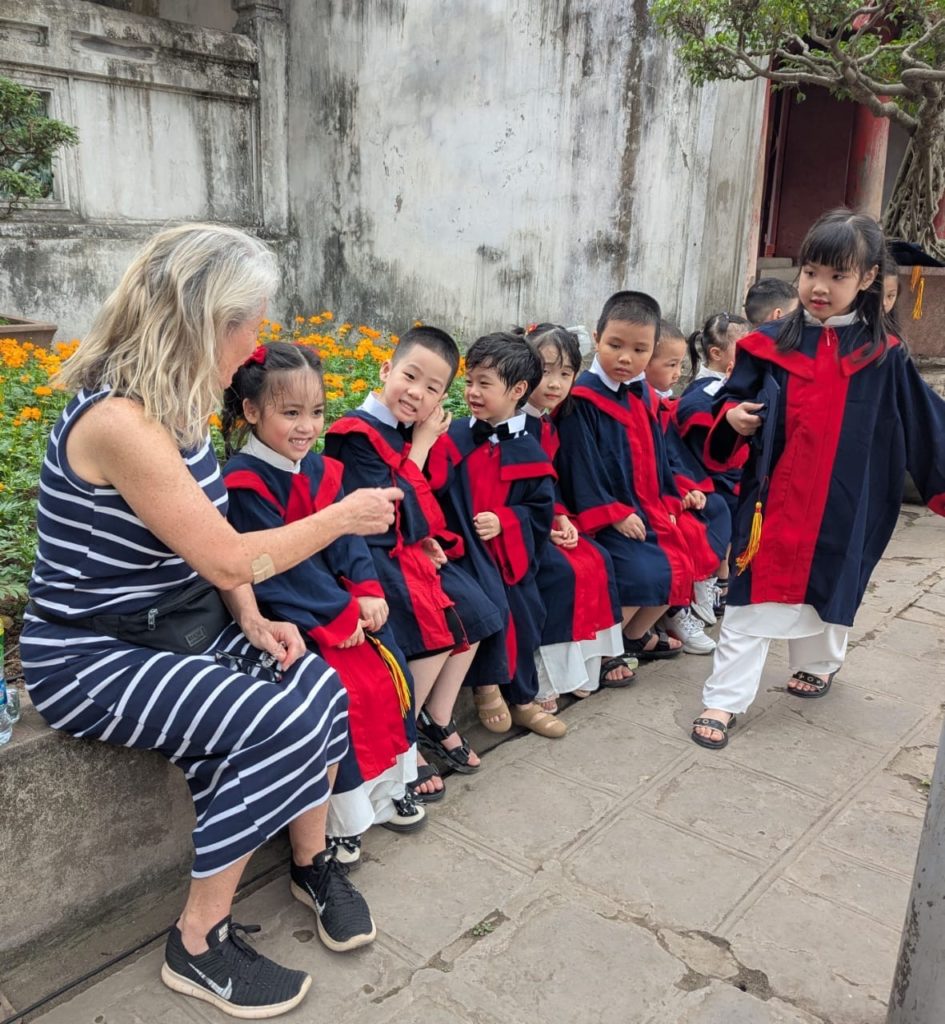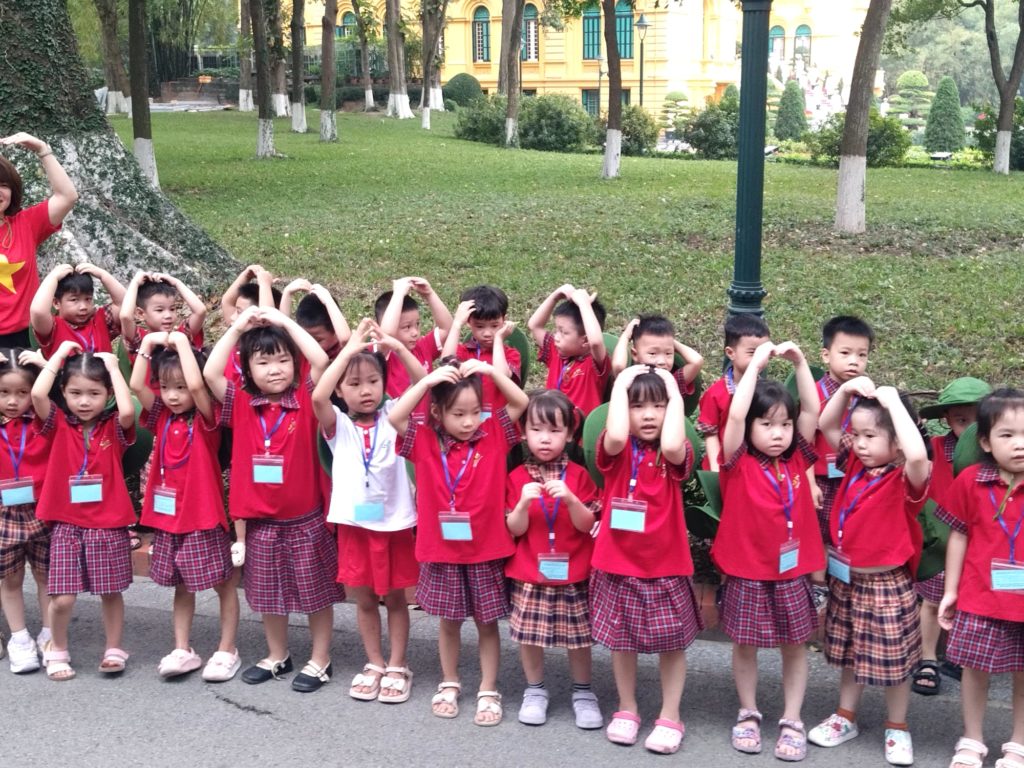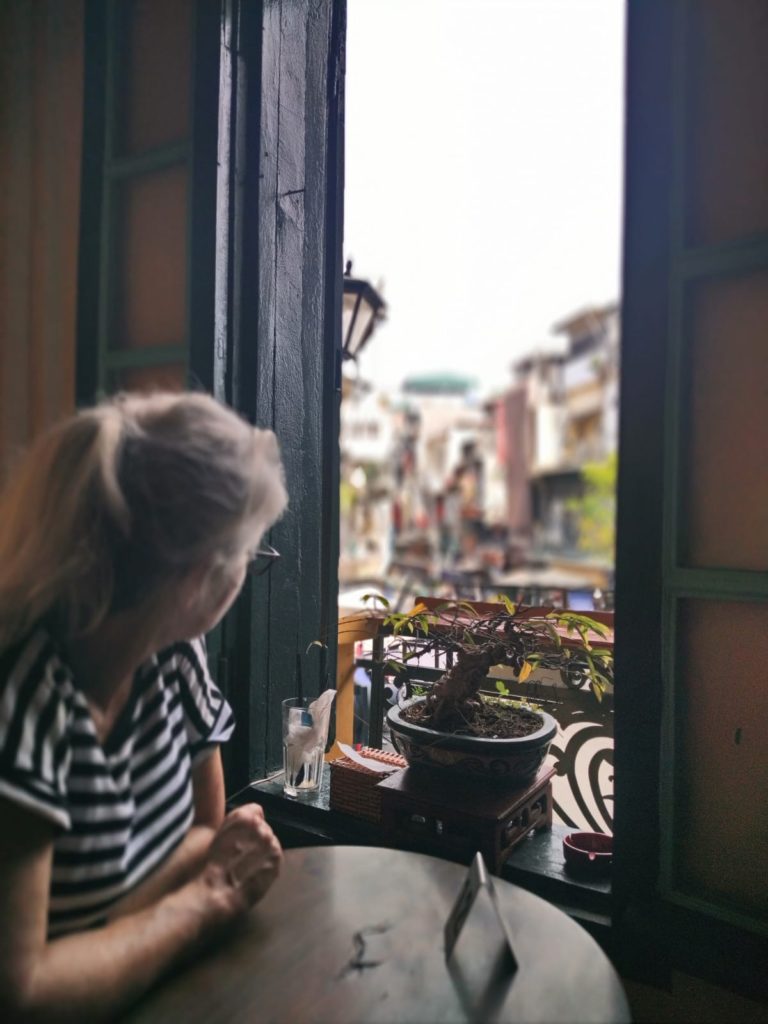
Those of you who read my occasional articles (hi mum) may recall that I am an international cyclist. Some colleagues derided me for this claim last year, but given I have previously provided pictures and the evidence is, therefore, irrefutable, I have determined that those who made jibes are just jealous and I should ignore them.
Further evidence of my international cycling is now available below as I have just returned from a trip to Vietnam, during which I cycled. I present the photo below and rest my case. (I may soon make a separate claim about being an international kayaker – but I digress).

Me, being an international cyclist
Respecting teachers
Curious about the status of teachers and teaching in Vietnam, while there I asked our tour guide whether teaching was considered high status or low status.
“High status” he replied without hesitation, and complete with hand gestures indicating significant height.
“And the pay? High or low?”
He dropped his hand. “Low pay” he said quietly.
“Are Vietnamese teachers mostly men or mostly women?”
“Mostly women”.
I’m not sure that the fact that most Vietnamese teachers are women and the fact that the pay is low are related facts, but I have my suspicions. Vietnam is not the only country where these two facts co-exist.
Respect starts young
While in Hanoi, I visited the Temple of Literature, famous for having been Vietnam’s first national university. Among other activities, children of all ages, from as young as 3 years old, are brought to the Temple to graduate from their various stages of learning. In graduation outfits complete with mini gowns and mini mortarboards, they line up with certificates for photos by proud teachers and family members. Respect for education is evident.
When I asked permission to join in the photography of a number of groups of children, I was enthusiastically pushed forward by parents and teachers to secure unimpeded views of the small graduates, while their attending adults called out posing instructions to them.
It was not unlike what I suspect a red carpet celebrity event might be like – lots of photographers jostling for the best position while shouting requests to celebrities about how to pose and where to settle their gazes.

Vietnamese children graduating at the Temple of Literature, Hanoi, 2025
The kids appeared mostly polite and quietly accepting of their celebrity, except temporarily when one group – apparently invited by an event coordinator (complete with ‘Madonna headset’ and microphone) to show their teacher their appreciation. At this point, they charged toward their teacher as a determined, pint-sized herd and literally knocked her to the ground before clambering over each other to touch and hug her. I was so surprised I failed to capture this in a picture.
The teacher had to be helped up afterwards and limped around holding her back for a few minutes – while grinning from ear to ear. ‘Madonna’ issued further instructions and the children rushed back to their photo lines, also grinning widely.
When the photography was over, I went and sat in a small wall to rest in the unseasonable high heat and humidity. My pint sized friends joined me on the wall, directed by ‘Madonna’. Some of my closer colleagues know my ultimate career goal – temporarily thwarted in the early 1990s by the Victorian Premier Kennet Reforms, which coincided with my own graduation as a teacher – is to teach grade 1, so I was in heaven. Surrounded by 6 year olds, I was allowed to join their game of rock, paper, scissors. They also taught me the latest ways to pose for photos. We should put kids in charge of international relations, really.

Rock, paper, scissors
Respect for teaching in different countries
Earlier that day I had been reading Australian media about toxic parent WhatsApp groups where principals sometimes have to remind parent members about the inappropriateness of insulting and defaming teachers and school leaders. In a recent media article, president of the Australian Secondary Principals Association, Andy Mison commented on the growing violence in Australia schools, including against teaching staff, and what the causes might be.
He speculated about the influence of social media, rising socioeconomic stress and the increase in mental health conditions among the general public, and an increasing expectation that schools have a boundless duty of care, can provide a highly personalised program for every child despite not being resourced to do so, and can solve all of society’s problems.
Societal trends such as these are not confined to Australia, but the contrast between the ways in which educators are respected across cultures is noteworthy.
Back at the ranch(es)
After my trip, I returned to work at the Victorian Academy of Teaching and Leadership, where one of our legislated objectives is to raise public awareness of the capability and status of teachers and school leaders. We think such awareness raising requires collaborative and concerted effort from everyone inside and outside the profession.
During the week I had the privilege and joy of visiting two schools, one each in Moe and Bairnsdale where the Academy has regional centres. I learnt about how the challenges and opportunities in both schools are taken up equally by the leaders and staff. I left both reflecting on the absolutely inspiring and life-enhancing work people who work in schools do day in and out.
Back at the Academy centre between school visits, a colleague told me that one of the conversations that came up in a professional learning session underway that day was that the teachers disclosed that they don’t tell people what they do for a living in social situations.
I asked why not.
“They say they don’t want to have to deal with the comments about short hours and long holidays” my colleague replied.
Building respect
When we talk about teachers and teaching, is it worth considering how we frame the profession? Do we inadvertently repeat the (inaccurate) trope of teaching being an ‘easy job’ with short hours and long holidays or do we acknowledge and begin to raise awareness of the enormously complex challenges of effective teaching?
When discussing the profession, do we remember that teaching and teachers profoundly change and significantly enhance lives? As I have written about previously, from learning to read, write, be numerate, be digitally literate and know how to socialise and interact with others at the start of an education journey, to advanced and deep experiences in specialised areas later in that journey, teachers facilitate it all.
Further, it is often a teacher who makes a student feel seen, heard and that they have worth, who notices and nurtures individual talent, who enables someone from a disadvantaged background to take the steps to advance towards their potential, and who provides a stable and safe environment for a child or young person where they do not have one at home.
Teaching enables every individual to advance their knowledge, skills and agency and, therefore, it enables every part of society to function effectively. Teachers deserve our profound admiration and respect. Yet teaching and teachers are often not as well respected in Australia as they could be.
We can all play a part in addressing this by thinking, speaking and behaving respectfully in relation to teaching and teachers.


An earlier version of this article appeared on LinkedIn on May 10, 2025.